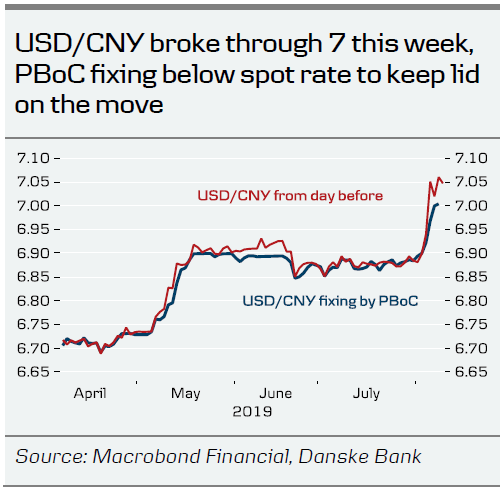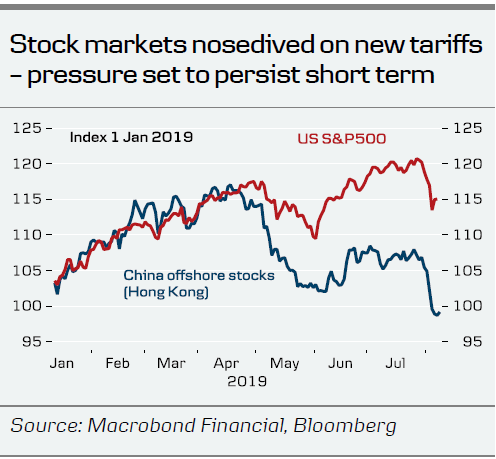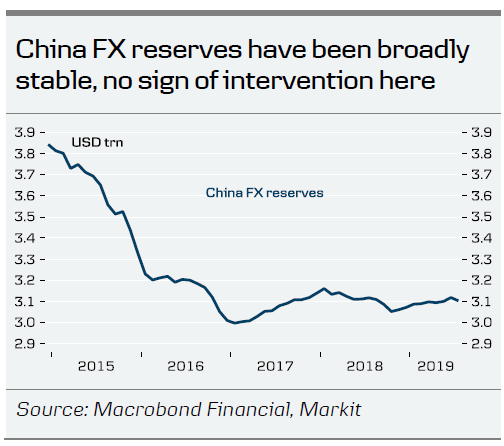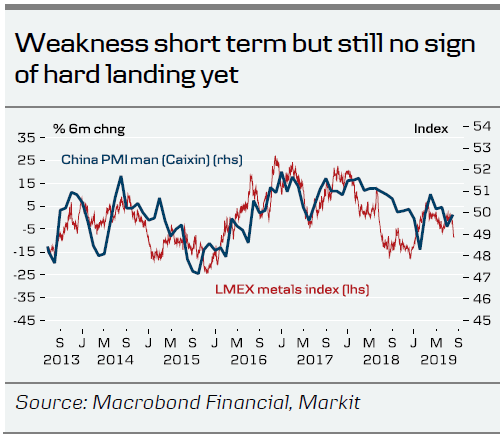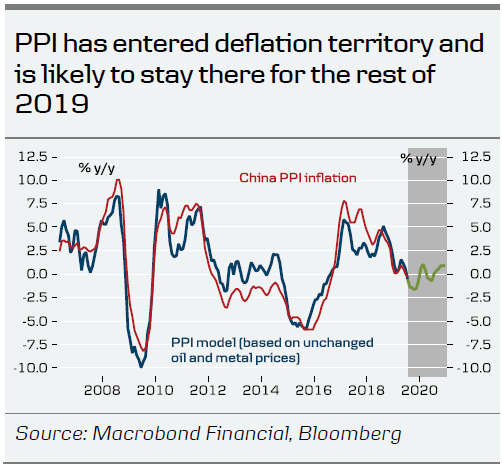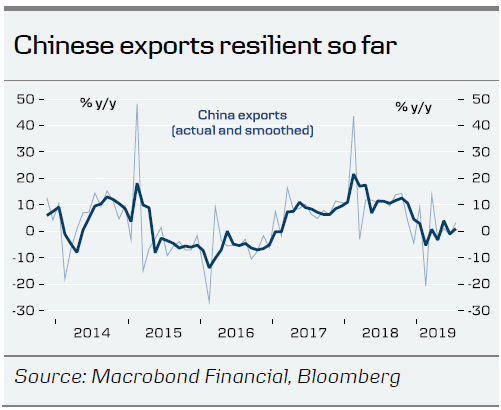- US-China trade tensions reached a new low point this week. China is waving the ‘rare earth card’ in a sign of what might come next if Donald Trump adds more tariffs.
- USD/CNY broke through the 7 level, triggering the official US label of ‘currency manipulator’. We look for more CNY weakness but no devaluation.
- Export data were better than expected, while producer prices hit deflation territory. Metal prices are softening but still do not point to a hard landing in China.
US-China relations reach a new low point
The already-strained relationship between the US and China hit a new low point this week. A push higher in USD/CNY through the psychological level of 7 was a red flag for US President Donald Trump, who quickly turned to Twitter, naming China a ‘currency manipulator’. Shortly after, the US Treasury Department issued an official statement designating China a ‘currency manipulator ‘, although China does not fulfil the three criteria the Treasury normally uses to determine whether a country is a ‘currency manipulator’. The People’s Bank of China (PBoC) was quick to deny the accusations , saying the CNY weakening was a market response to Trump’s tariff announcement last week. China found backing from former US Treasury Secretary Lawrence Summers, who in an op-ed in The Washington Post wrote that China did not ‘come close to fitting this template [of currency manipulation]’ and highlighted that China’s ‘interventions in the past couple of years have been to prop up its currency rather than to drive it down’. In July, the IMF said the Chinese currency was in ‘line with fundamentals’.
It seemed Trump’s economic adviser Larry Kudlow wanted to smooth things out a bit in comments to CNBC on Tuesday, as he highlighted that ‘the reality is we would like to negotiate’ and added that ‘we’re planning for the Chinese team to come here in September’.
Trump’s big headache in the trade war is the pain inflicted on US farmers, as they are key voters in swing states such as Iowa, Ohio and Wisconsin. Following confirmation from China that it would again stop buying US agricultural products , Trump tweeted that China would not be able to hurt farmers and hinted at more financial support. The President of the American Farm Bureau Federation said that ‘we know aid can’t last forever’ and China’s import cut-off was ‘a body blow to thousands of farmers and ranchers who are already struggling to get by’.
China this week waved the ‘rare earths’ card again , as China’s rare earths association said it would support Chinese counter measures. The statement came after a meeting to discuss the ‘guidance’ of Chinese President Xi Jinping during a visit to a rare earth plant in May.
Bloomberg reported on Thursday that the US will hold off on a decision about licences to US companies that would allow them to do business with Huawei. While Trump has said the issue does not relate to the trade talks, it seems to be connected to whether or not China buys agricultural goods from the US.
Comment: This week we changed our baseline view to a ‘no-deal’ scenario, as we now believe the two parts will no longer be able to bridge the gap to reach a deal on this side of the US Presidential election in November 2020. See more details in US-China Trade – Three trade war scenarios – ‘no deal’ now our baseline, 8 August.
We do not expect significant further escalation, as it would do more damage to the US economy. However, we cannot rule out China starting to restrict exports of rare earth metals in retaliation if the US does not lift the import ban on Huawei.
On the issue of currency manipulation, the US now plans to engage with the IMF to discuss the matter. However, we believe the IMF will find it hard to back the US on this matter, as there is no evidence China has actively taken steps to weaken the currency. The currency move this week related to the US tariff announcement and as such reflected a change in fundamentals. In addition, while China has raised the USD/CNY fixing over the past week, it has done so in line with its’ usual procedure of taking the closing level of USD/CNY at 16:30 the previous day into account and then adding a ‘counter-cyclical’ factor to dampen the swings. For the past four days, China has fixed the CNY at a stronger level than the market rate and as such used the counter-cyclical factor to restrain the rise in USD/CNY.
Change to USD/CNY forecast: higher but no devaluation
This week we changed our forecast for USD/CNY on the back of the break of 7 and the renewed trade war escalation (see FX Strategy – USD/CNY breaks 7 but no devaluation on the cards, 5 August). We now look for USD/CNY to continue a gradual move higher to 7.20 in 6M and 12M but we have a high conviction that China will not devalue its currency. It would harm not only the US but also other countries. China needs friends at the moment and not more foes. In our view, the country also wants to be seen as a responsible stakeholder in the global economy and we believe a devaluation would ruin that immediately. Finally, it could easily backfire by triggering capital outflow pressure.
China released FX reserves for July this week, which showed a small decline. However, the big picture is that currency reserves have been very stable for the past three years and as such point to limited intervention in markets (see chart).
Economy weak but not falling out of bed
Export data this week were surprisingly resilient. July exports increased 3.3% y/y following a decline of 1.3% y/y in June. Imports were also a bit stronger than expected. Metal prices, a good indicator of Chinese activity, have fallen lately but still do not point to a hard landing. CPI inflation increased to 2.8% y/y in July from 2.7% y/y in June. Producer price inflation (PPI) fell into deflation territory for the first time in three years.
Comment: While the trade war is taking a toll on Chinese growth, there is still no sign of a severe downturn. The deflation in PPI reflects the decline in commodity prices over the past year (see chart).We believe the leadership will watch the situation closely and add more stimulus if signs of a steeper slowdown emerge. The pain from the trade war will be felt as much in the medium term from less direct investments and some companies moving production to other low-wage countries.

